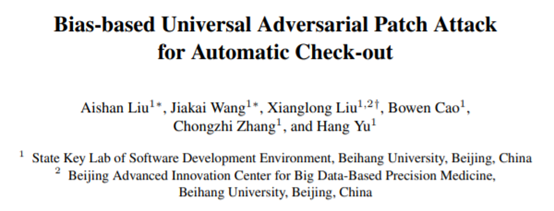Bias-based Universal Adversarial Patch Attack for Automatic Check-out
Adversarial examples are inputs with imperceptible perturbations that easily misleading deep neural networks(DNNs). Recently, adversarial patch, with noise confined to a small and localized patch, has emerged for its easy feasibility in real-world scenarios. However, existing strategies failed to generate adversarial patches with strong generalization ability. In other words, the adversarial patches were input-specific and failed to attack images from all classes, especially unseen ones during training. To address the problem, this paper proposes a bias-based framework to generate class-agnostic universal adversarial patches with strong generalization ability, which exploits both the perceptual and semantic bias of models. Regarding the perceptual bias, since DNNs are strongly biased towards textures, we exploit the hard examples which convey strong model uncertainties and extract a textural patch prior from them by adopting the style similarities. The patch prior is more close to decision boundaries and would promote attacks. To further alleviate the heavy dependency on large amounts of data in training universal attacks, we further exploit the semantic bias. As the class-wise preference, prototypes are introduced and pursued by maximizing the multi-class margin to help universal training. Taking AutomaticCheck-out (ACO) as the typical scenario, extensive experiments including white-box and black-box settings in both digital-world(RPC, the largest ACO related dataset) and physical-world scenario(Taobao and JD, the world' s largest online shopping platforms) are conducted. Experimental results demonstrate that our proposed framework outperforms state-of-the-art adversarial patch attack methods.
PDF Abstract ECCV 2020 PDF ECCV 2020 Abstract

 RPC
RPC